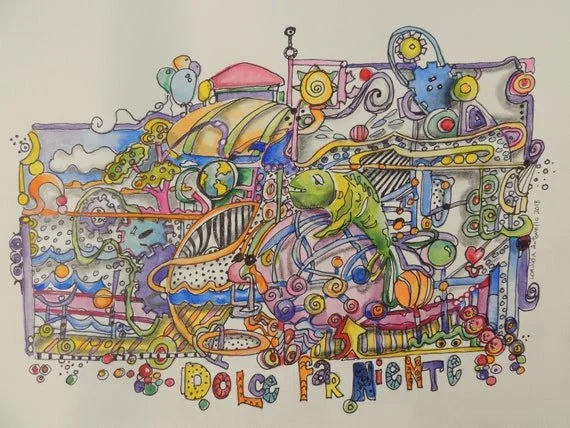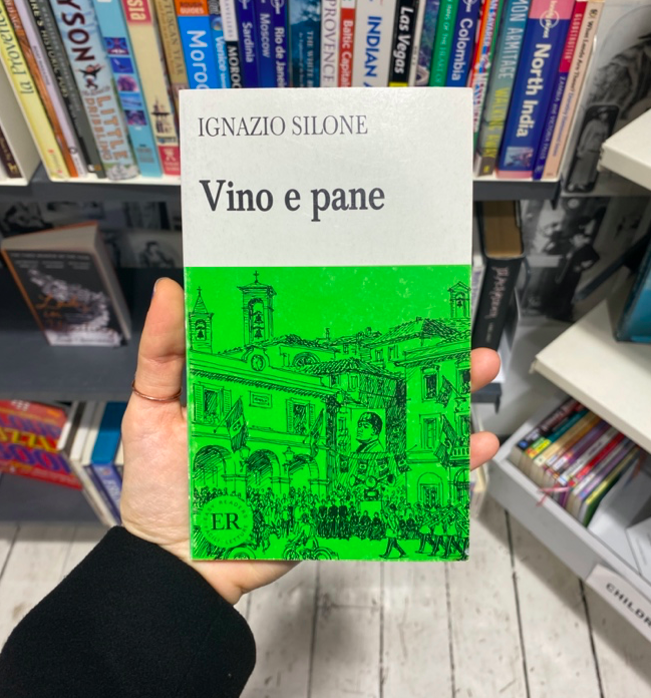Il tesoro smarrito del dolce far niente
Image credits: InstaScreenshot wallpaper/Google landscape illustration
Seems paradoxical for a group of four words to fail the gamble of translation. Il dolce far niente is rarely spoken out loud: in fact, a verbal expression of its philosophy can’t yield a defined, accurate mental picture. As a soul-nurturing celebration, it is too much of a sensory- experience to achieve its complete meaning with language. Clearly, the challenge has been established. However, my aim is to show you how and why doing nothing (rather than something) is not just an Italian, utopian treasure.
What we must begin with is the relationship between Italians and their respective authority figures, who, without doubt, have been reliable protagonists of satire, sources of disdainful inspiration for the working class and their unjust belonging to such a precarious job market. There’s very little faith in the system across the 20 regions of the boot-shaped country. So much corruption. For as long as I can remember, conversations about the future have always depicted it uncertain, blurred. Soul-escaping became only necessary.
Mutual effort and exchange are crucial when exploring this argument from the perspective of Italians: if they (the authorities) don’t care about us, why should we care about ourselves? That’s the exact recipe for the dialectic expression chissenefrega: Italians are surrounded by a surreal accessibility of the dolce far niente. It materialises linguistically in their expressions (passeggiata -afternoon walk-, abbiocco -feeling drowsy after lunch-, pennichella -nap-), mirroring a desperate desire to savour immediate pleasure, to experience a lack of responsibility. However, there’s a reason why the dolce far niente is called an art: it requires creativity, as any rule would be futile and obviously fuori-tema. It’s about being maestri dell’improvvisare, masters of spontaneity.
The idea of dolce far niente is supposed to be a soul constructive kind of experience. As for Italians, it could be thought of as the modern version of what Roman otium used to be: a time to rest the body and nurture the the mind, cultivate friendships, grow spiritually and enjoy i piaceri della vita. Otium, for the Romans, wasn’t idleness – which was instead frowned upon – but rather time destined to the creation of our wisdom, confronting one’s thoughts with others and discussing about life. It was only in later times that this precious escape got lost in the restless rhythms of modern life. And so, rest became a mere way to recover from the mountain of responsibilities we subject ourselves to.
Il dolce far niente may not be useful, but it should be protected and not demonised just because it’s practiced on a whim, when people feel like it. On the contrary, that’s exactly what makes it special: it makes us appreciate life as better people, who are not distracted but tied to that very present moment. It allows us to be who we truly are, where our role in society isn’t defining us, where nothing and no one is defining us. We are the ones defining who we want to be by choosing how to spend that indispensable time.
Image credits: Lorinda Antonello via Etsy
So, what are the ingredients that grant for this guilt-free detachment? How can we engage in this conscious performance of daydreaming? Perhaps, what renders this supposed luxury not so out of reach for Italians is their anthropocentric attitude: we view themselves at the centre of our respective realities, measuring up the resources in the surroundings against our needs. This seemingly arrogant approach is instead the most rewarding experience we could indulge in, one that normalises allowing ourselves to admire stillness in a carefree way, con spensieratezza.
Italy is a young country, where the fragments of the peninsula only unified in a tricolour jigsaw only in 1861. The country still mantains that riot-like attitude towards its political leaders, which reinforces that more than justified sense of alienation between rulers and ruled. So, the survival mechanism is born. When there’s chaos all over, Italians consciously manipulate time and turn into an opportunity for fulfilment. They are masters of the dolce far niente, because they pay attention to details, as punti di riferimento.
This reinforces the label of authentic conveyed at their art, their espressos, their landscapes. Italians aren’t afraid to be nostalgic; their souls have been employed as the very receivers of fleeting moments, where reminiscing is imperative. Italy settled in its childhood for eternity; spensieratezza reigns, delivering the temporary juxtaposition of what truly matters and teaching its citizens to marvel at everything, by losing themselves in that unrepeatable instant.
Why does this seem so utopic to achieve in other societies? It’s no surprise that the issue stems from direct discouragement of its very very principles. We’re stuck in the ubiquitous blueprint of the productivity cult, where we’re guilty of membership. We keep allowing ourselves to be constantly interrupted, zigzagging duties and ultimately dislocating ourselves from the privilege of observing life’s seconds. Our perception of reality has been compromised by a curse, where the only successful way to spend our time is by shifting our identities. From human being to human doing, where simply existing has become a foreign concept. Or perhaps, I hope, it’s just a recessive allele that we need to awaken. And to be completely honest, I wish I could pave you the way. Show you what it’s like to breathe guilt-free oxygen sopra un balcone italiano. What it’s like to opt for a view of neglected household shrines over the shiny blue light of our portable screens.
Image credits: Anja Gogo
Image credits: Anja Gogo
Whether it’s enjoying a “bicchiere di vino con un panino” or else, I can’t say - I’m too busy unwinding outside, sitting in a sunny square, reading my favourite book (mind you, it’s not the one above) and waiting for my daily espresso. But I’ll tell you this: it doesn’t need to a be a labyrinthic search. We just need to come to terms with the fact that society needs to stop honouring merely our rational side. And that’s because, in that process, the gift of our intuitions is what remains forgotten.



